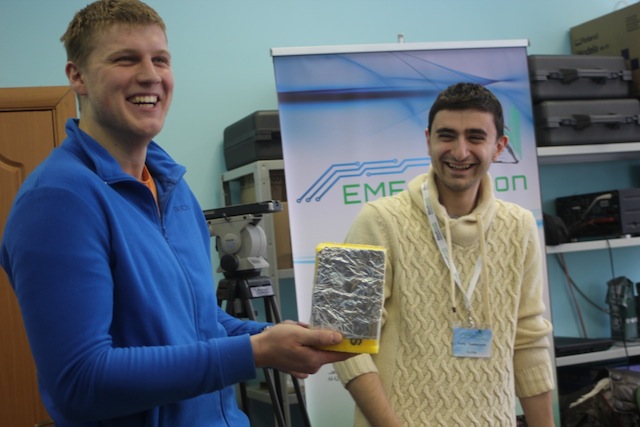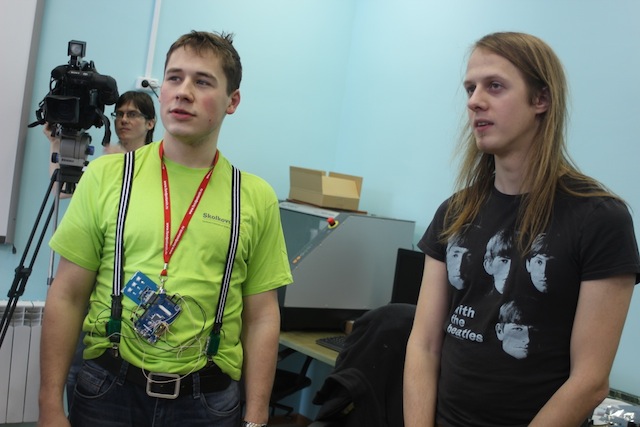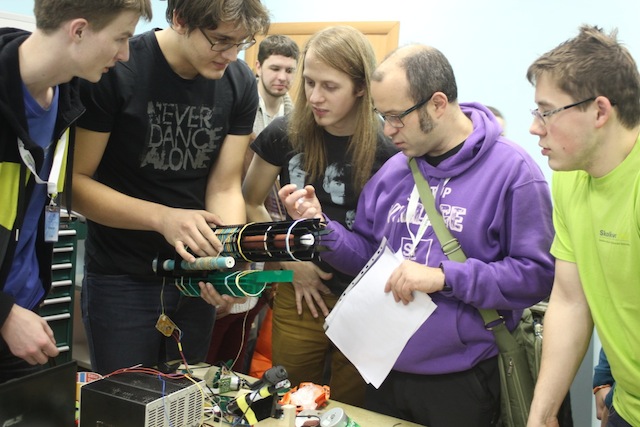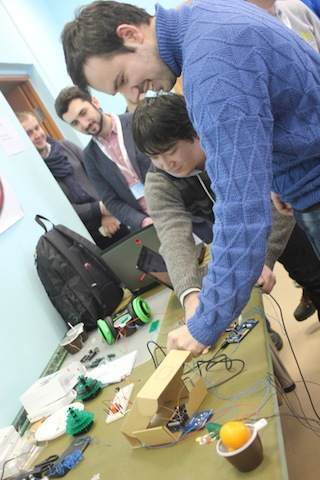Skolkovo Institute of Science and Technology announces the completion of the 48-hour Skoltech Hackathon 3.0, held on January 31 – February 2, 2014 at the “Knoket” Center for Youth Innovation Creativity (CYIC) at the address 25 Bolotnikovskaya Street.
The Skoltech Hackathon 3.0, which was held in Moscow this weekend, is a student initiative, based on international and Russian experience of participation and victory of Skoltech students in the Hackathon of the Massachusetts Institute of Technology (MIT) in the U.S.A., as well as in the Hackathon 2.0, held in Russia in December 2013.
Skoltech Hackathon was the third such event, and this time it was devoted to electronics. It was held under the auspices of Emecs-thon, the international Hackathon on embedded systems, which this year was held simultaneously, in real time, in six countries: Germany, England, Norway, Romania, Palestine, and of course, in Russia.
Representatives of three universities took part in Skoltech Hackathon 3.0: Skolkovo Institute of Science and Technology (Skoltech), Moscow Institute of Physics and Technology and M.E. Bauman Moscow State Technical University. Eight teams were formed, but only five teams reached the final presentation to members of the Russian and international jury. “The work on the development of an embedded computer system from the scratch turned out to be too tense and difficult”, says one of the participants of the Hackaton. The teams worked on their projects for 48 hours. During this time, the participants of the Hackaton created magnificent designs and prototypes that were submitted to a competent jury.
“The idea of each project originated from a specific problem. That is why the success rate of each of them is so high,” says Tigran Shakhverdyan, co-founder and executive director of the startup RoboCV, engaged in the creation of intelligent autopilots for transport.
The creative approach in the production of prototypes greatly distinguished the participants of Russian Hackaton from students of other countries. Many prototypes were made of improvised materials, which students could find everywhere. Thus, one could see parts from an old printer, a sponge or even a simple rubber band, skillfully implemented in the project, in the models of the prototypes. However, the students used not only improvised materials in the production of prototypes. The equipment of the “Local Lab” of Skoltech Hackathon 3.0 consisted of soldering stations, milling machines, a laser cutting machine, etc. The competition was strict and fair, and that is why it was forbidden to use 3D printers – not all of the participating countries had necessary counterparts.

The projects have found their applications in various fields of human activity. Two teams took seriously the eternal problem of the majority of people – an incorrect posture – and offered their solutions to this problem. Thus, the first group of students made special braces, which give an opportunity to control and adjust the posture of a person. The team assessed various medical characteristics and concluded that one of the most important indicators was the curvature of the back. A miniature elastic tension sensor was mounted in the braces, which allowed seeing and assessing the degree of the spinal curvature at each time point. The second team also worked on a similar problem and developed a draft of a smart chair: the system reads the data on a seated man in a special way, collects and analyzes the data and, consequently, allows controlling one’s posture during the day. Other students also thought about life in the office and developed a prototype that allows performing real-time control over the flow and temperature of water in the cooler. This simple solution can also be applied in various other hydraulic systems, where it is necessary to quickly calculate and predict the flow of water. Another group of students attended to the cooking process. This team developed a prototype of a device that can be attached to any kitchen appliance, which allows determining the temperature of the food being cooked, the degree of preparedness, and other characteristics. It is important to note that all the data are collected on a single medium and, if the dishes are cooked successfully, you can use them as the initial data for a new recipe. The last project was the prototype of an automatic alarm system. The device is equipped with a special face recognition camera, which responds to human movement and displays the image on the computer screen. The use of this prototype is quite varied, depending on the purpose and use of specific materials. The team told about the way it could be used, for example, on your household plot, and offered an option for the implementation of this prototype in case the Ministry of Defense was interested in it.

It proved very hard to select the finalists of the local Skoltech Hackathon 3.0, all the projects were worthy of victory. After long discussions, it was decided not to distinguish just one team, and therefore special nominations were awarded and different teams received them. The team with the prototype of an automatic protection system won the nomination of the “Best Technology Idea”. The nomination of the “Best Business Idea” was won by the team that had developed special braces allowing for adjusting one’s posture. A special nomination was awarded to the team that had developed a system for the control of water flow. In addition, the prototype of a smart chair, which also allowed improving one’s posture, won the Audience Choice Award, who appreciated the creative approach and the results of the team’s work.
“I was greatly impressed by the projects presented at the Skoltech Hackathon today. The teams created excellent prototypes from scratch in just 48 hours, and then proved their suitability. The members of the jury expressed their ideas on the application or improvement of the prototypes, but I can confidently say that these were all great results,” said Alessandro Golkar, professor of Skoltech, specializing in the development of tools and methodologies for the architecture of large engineering systems.

After several hours of intense discussions, exchange of impressions and information with other countries participating in the Hackaton, the global finalist was determined. In a difficult struggle, the team from Norway won the title of “EMECS-thon GURU”, coming just a little ahead of the Russian team with its “Posture Guard” project, involving the development of braces, which allow controlling and correcting one’s posture. The prototype of the project was developed by three students of the Skolkovo Institute of Science and Technology: Rustam Akhtyamov, Oleg Urzhumtsev, and Urman Boris.

Skoltech Hackathon 3.0 ended on Sunday evening, February 2, with the awarding ceremony of winners in Russia, and awarding of the international winner. After the official part, the Hackathon was continued by a discussion of each of the projects in private conversations: the jury and experts of the Hackaton gave their professional advice to the team members, assessed their market potential and discussed the implementation of new ideas of the tireless Hackaton participants.
Reference information:
EMECS-thon is an annual marathon competition in the field of embedded systems; it is open to students of universities of the EMECS consortium, and partner universities. The event is organized annually and is held simultaneously in all the universities of the EMECS consortium, and in the partner universities.
